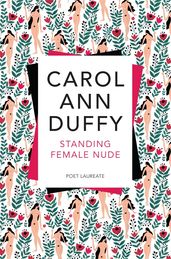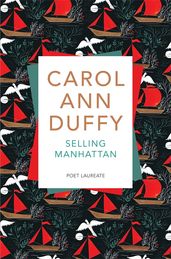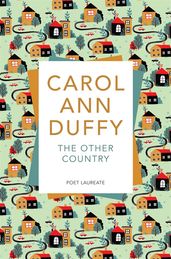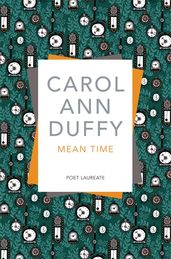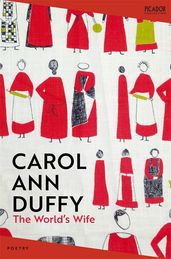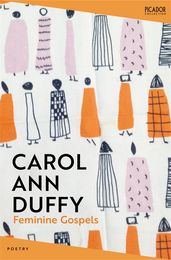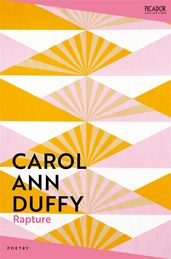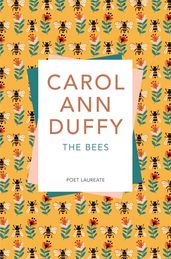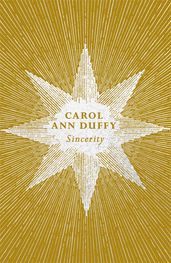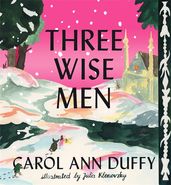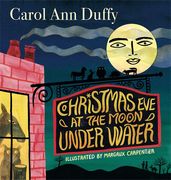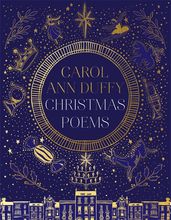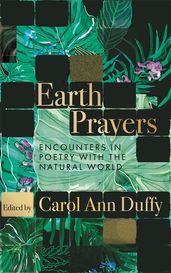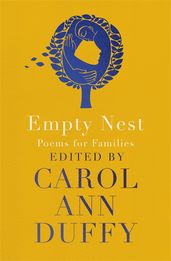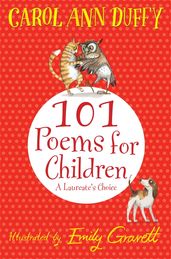Carol Ann Duffy's poems: a complete guide
Dark, comic, moving, feminist. Here's our guide to the poetry of former Poet Laureate Carol Ann Duffy.
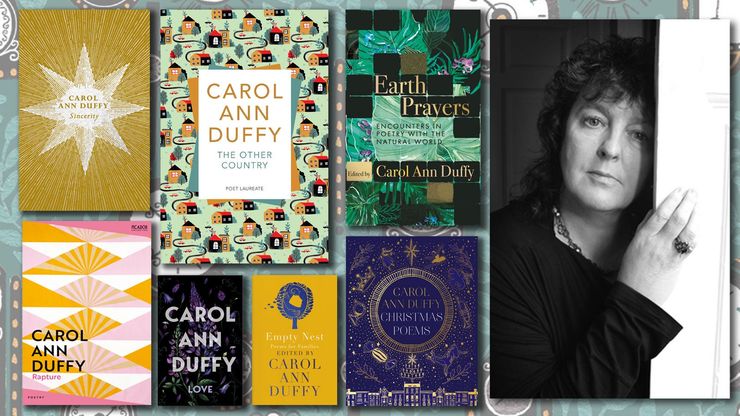
People come to the work of Carol Ann Duffy via various routes. She rose to public prominence as Poet Laureate in 2009 (or, it could be argued, ten years earlier when she was apparently passed over in favour of ‘safer’ choice Andrew Motion). Her appointment made her the first female Laureate since the position was created in the seventeenth century – she reportedly only accepted the post for this reason – and also the first Scottish-born and openly gay poet in the role.
For anyone who was a teenager in the nineties or later, though, she was already well-known. Her poems are a constant on British school exam syllabuses, although one, ‘Education for Leisure’, was infamously removed by an exam board in 2008. (Duffy responded in verse, penning ‘Mrs Schofield's GCSE', named after an external examiner who complained about the poem, on the importance of poetry.)
Many, of course, have been following Duffy since she won the National Poetry Competition in 1983, and published her first collection, Standing Female Nude, in 1985. And those completely new to her poetry are in the enviable position of being able to experience the revelations of her – now considerable – body of work for the first time.
Her award-winning poetry is known for its accessibility, its feminism and its frequent use of dramatic monologue, with many poems taking the form of a speech from an individual character. Her work is often comic, often dark, often deeply, knottily romantic; never classifiable as one thing or another. Whether you're wondering where to start, or where to dip in next, read on for our guide to her collections and anthologies.
What are Carol Ann Duffy's latest collections?
These four themed collections draw on poetry written over forty years, as Duffy selects her favourite poems on the subjects of love, death, politics and the natural world.
Carol Ann Duffy's poetry collections in order
Standing Female Nude
by Carol Ann Duffy
'When it’s finished
he shows me proudly, lights a cigarette. I say
Twelve francs and get my shawl. It does not look like me.'
So asserts the eponymous protagonist of this collection's title poem, refusing to be contained by the male artist's representation of her. And so we are introduced, in this, her first book of poems, to Duffy's startling, feminist voice, and her use of dramatic monologue. Lovers, wives and war photographers all appear here, their stories ranging from the delicately poignant to the fiercely political.
Selling Manhattan
by Carol Ann Duffy
'One of those rare books that is immediately enjoyable yet will repay many re-readings.' Poetry Review
Duffy's second collection shows her really taking hold of her talent, with meditations on death and art, poems of protest and poems of love. There's a resounding determination to give voices to those who are usually voiceless, alongside her inimitable wit, wisdom and imagination.
The Other Country
by Carol Ann Duffy
'The other country, is it anticipated or half-remembered?'
Prepare to re-examine everything you thought you knew about our most human drives and desires, as the lines between reality and fiction, and confession and delusion, are blurred by a choir of disarmingly direct poetic voices. Originally published in 1990, The Other Country features British exam favourite 'In Mrs Tilscher’s Class'.
Mean Time
by Carol Ann Duffy
How many teenagers decided onions were the most romantic things they could think of (and then perhaps had second thoughts after further analysis), thanks to Mean Time? 'Valentine', from this double-award-winning 1993 collection, is another of Duffy's poems to feature on UK exam syllabuses and probably forms many readers' first encounter with her work. A crowd of childhood, adolescent and adult vignettes with a dark, subversive heart, this is a collection that will, like the onion's scent, cling to your fingers, cling to your knife.
The World's Wife
by Carol Ann Duffy
Retelling stories from women’s perspectives may feel like a recent phenomenon, but Duffy was doing it, with wit, imagination and a cold sliver of steel, back in the late nineties. From Little Red Riding Hood to Mrs Freud via Circe and Queen Kong, each poem focuses on the female counterparts of well known male figures – both real and fictional. They are a playful, often hilarious (Icarus's wife should be given a stand-up slot or at least access to Twitter for some acerbic one-liners) challenge to the patriarchal structures and language alluded to in the collection's title.
Feminine Gospels
by Carol Ann Duffy
‘Part of Duffy’s talent [. . .] is her ventriloquism . . . From verbal nuances to mind-expanding imaginative leaps, her words seem freshly plucked from the minds of non-poets – that is, she makes it look easy.’ Charlotte Mendelson, Observer
In Feminine Gospels, this ventriloquism takes centre stage, as Duffy draws on historical, archetypal, biblical and fantastical figures to create visions and revisions of female identity. Women transform on the page – a shopaholic becomes a shop, a notoriously beautiful woman turns into another, and another, each defined only by their effect on men – stripped naked and yet constantly disguising themselves. A feminist classic.
Rapture
by Carol Ann Duffy
Duffy's poetry is incredibly easy to read, in the best possible way, and Rapture is often considered her most accessible collection – a good place to start if you're new to her work. It is, in short, a book of beautiful love poems, full of the burn, ache and dance that comes with that emotion.
'I read it on the tube, and missed my station. I read it in bed, and couldn't sleep. I read it at my desk, and started to cry,' writes Elaine Feinstein in a Guardian review. 'Affairs are notoriously disruptive [. . .] Reading about an affair is not supposed to have the same effect. But it does in the case of Carol Ann Duffy's Rapture.'
The Bees
by Carol Ann Duffy
The Bees is Carol Ann Duffy’s first book of poems as Poet Laureate. Unlike many of her collections, the poems here are not linked by theme – there are drinking songs, love poems, political poems, elegies. Having said this, whether via a low buzz or a sharp sting, bees are present throughout, representing and reminding us of what is most precious and necessary for us to protect.
Sincerity
by Carol Ann Duffy
Fittingly for her final work as Poet Laureate, this collection is at once intimate and public, casting its eye inwards and also unpicking the politics of the day and taking stock of a world in turmoil in some of Duffy's most radical writing to date. A rallying cry builds steadily through the book culminating in a moving closing ode to the virtue of sincerity.
Carol Ann Duffy's Christmas poems
Three Wise Men
by Carol Ann Duffy
In Three Wise Men, Carol Ann Duffy invites readers into a magical winter's night, where a traveller, seeking refuge from a snowstorm, finds warmth in an ancient hall – and in the timeless stories of three mysterious figures. As the traveller listens, each tale unfolds into a rich parable of longing, life’s transience, and the search for meaning. Enhanced by stunning illustrations, Three Wise Men is a beautifully crafted ode to the season, where truth and fable intertwine.
Christmas Eve at The Moon Under Water
by Carol Ann Duffy
For the decade she was Poet Laureate, Duffy published an illustrated Christmas poem every year and this tradition has continued beyond that tenure. 2023's festive offering is illustrated by Margaux Carpentier. In Christmas Eve at The Moon Under Water all the old rivalries of the natural world are suspended for one miraculous night, as man stands shoulder to shoulder with animal, and predator and prey add warble and wail to the Yuletide chorus.
Christmas Poems
by Carol Ann Duffy
Christmas Poems brings Duffy's annual poems altogether in one collection for the first time alongside beautiful artwork from Rob Ryan, David De Las Heras and Lara Hawthorne, and others.
Anthologies
Earth Prayers
by Carol Ann Duffy
Earth Prayers weaves together poetic voices from across centuries, revealing a timeless dialogue between humanity and the natural world. From the pastoral reflections of John Clare to the fierce eco-consciousness of contemporary writers like Lucille Clifton and Kathleen Jamie, this collection highlights both the beauty of nature and the urgency of its defense. In Jorie Graham’s poignant plea, the earth itself speaks, while Stephanie Pruitt’s 'Mississippi Gardens' exposes the scars left by history. With themes of reverence, sorrow, and fierce advocacy, Earth Prayers reminds us of our place in the intricate weave of the natural world – and our responsibility to protect it before it’s too late.
Empty Nest
by Carol Ann Duffy
This anthology explores fathers', mothers' and children's feelings about leaving home, and takes its title from one of Duffy's contributions, in which a house “pines” when her daughter is away. Covering aging, love, grief and estrangement, it brings together modern and classic poems from Shakespeare to Simon Armitage via Imtiaz Dharker and Duffy's own daughter, Ella. A perfect read for those suddenly facing a house that’s much cleaner but also much quieter than it was.
101 Poems for Children
by Carol Ann Duffy
Whilst we should all still heed the advice to shun the frumious Bandersnatch, this collection of brilliant classic and modern verse (including 'Jabberwocky') will ensure children never shun poetry. Alongside Lewis Carroll's nonsense poem you'll find Edwin Morgan's 'The Loch Ness Monster's Song', 'Balloons' by Sylvia Plath, plus ninety-eight other fantastic poems sure to inspire a new generation of poetry enthusiasts.
Duffy has also edited Off the Shelf, a celebration of bookshops, To the Moon, an anthology of lunar poems, Answering Back, in which fifty fellow poets choose and respond to a poem from the past and Hand in Hand, a book of love poems.




